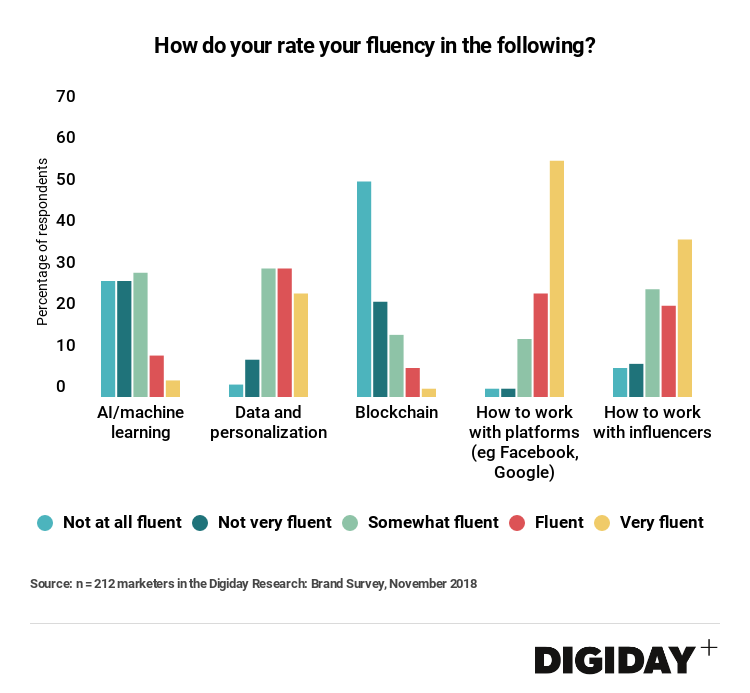Save 50% on a 3-month Digiday+ membership. Ends Dec 5.
Digiday Research: Marketers lack understanding of emerging technologies
This research is based on unique data collected from our proprietary audience of publisher, agency, brand and tech insiders. It’s available to Digiday+ members. More from the series →
There’s no shortage of vendors promising that buzzy new technologies can help make marketing and advertising easier, better and more cost-effective. But when it comes to assessing the potential of technologies such as machine learning, artificial intelligence (AI) and blockchain, most marketers are far from confident in their abilities, according to Digiday research.
Of the 212 client-side marketers polled by Digiday this November, only nine percent described themselves as fluent in blockchain, for example, and 14 percent said the same about AI and machine learning. That’s a departure from some more established digital marketing tactics and channels. Eighty-two percent of marketers in the Digiday survey claimed to be proficient when it came to marketing on social platforms, for example, and 60 percent rated themselves as “fluent” or “very fluent” when it came to working with influencers.
The impact of technologies such as AI and blockchain is largely hype according to many marketers, but it’s reality for others. Companies like Orangetheory have successfully used AI to cut down customer acquisition costs by improving the targeting ability of their media buying. Meanwhile, blockchain was widely touted as a new way to guarantee transparency within media buying and reduce ad fraud, though some of that initial enthusiasm has diminished.
Part of the reason marketers give themselves low marks for understanding these new technologies is a lack of available teaching resources. One marketer, who frequently uses machine learning to analyze and improve search campaigns and considers themselves proficient with machine learning technologies, told Digiday, “It is hard to learn these things because there is not a lot out there that give you the 101 of machine learning, AI and blockchain.” Some companies are addressing this problem themselves. Digital consulting firm PricewaterhouseCoopers created specialized two-year courses for its employees to learn about technologies like blockchain.
But most marketers don’t have the resources to support such initiatives in-house. As a result, many marketers learn from AI and blockchain from resources such as Google tutorials and meetings with vendors alone. Or by employing consultancy firms such as PwC. “When we speak with clients about blockchain, before we can even approach sales, meetings are largely just an education helping them understand what the technology is at a basic level,” said Nikao Yang, chief operating officer at Lucidity, a company introducing blockchain verification to programmatic advertising.

While marketers cannot be faulted for few learning opportunities, one of the main reasons why they lack solid understandings is that these technologies are not always applicable for their companies and roles. “If you’re a small-to-medium size business, you don’t have enough data or the guidance on what to use something like machine learning for,” said the search marketer. “Your resources are better spent building up your brand presence than trying to adopt those technologies.”
Ad position: web_incontent_pos1
One software engineer turned marketer well-versed in machine learning and AI agreed that it was not necessary for his team to be familiar with such technologies, “in the same way I would not recommend marketers learn about the intricacies of administering a web or email server.” He also added that while “blockchain as a concept is interesting,” it lacks applicability in marketing.
Marketers limited understanding of these technologies may also be distorting their expectations. A marketer who consults companies on machine learning processes admitted that “it can be exhausting to get their expectations in line with reality.” More often than not, marketers claiming things to be “AI-driven” that are are really just “exaggerating of the complexity of a system,” he said.
More in Marketing

Ulta, Best Buy and Adidas dominate AI holiday shopping mentions
The brands that are seeing the biggest boost from this shift in consumer behavior are some of the biggest retailers.

U.K. retailer Boots leads brand efforts to invest in ad creative’s data layer
For media dollars to make an impact, brands need ad creative that actually hits. More CMOs are investing in pre- and post-flight measurement.
Ad position: web_bfu